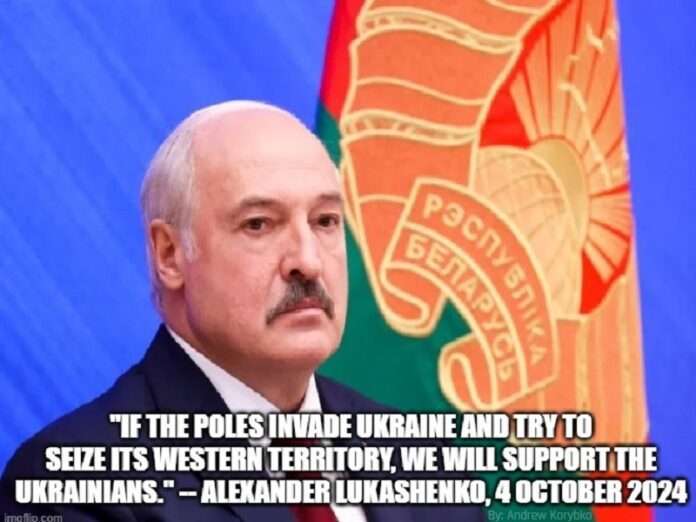Belarusian President Alexander Lukashenko claimed late last week that Poland wants “Both western Belarus and western Ukraine. They want to dominate there. This is unacceptable for us. If the Poles invade Ukraine and try to seize its western territory, we will support the Ukrainians. We realize that we will be next.” None of what he said should be taken at face value, however, especially the second part about Belarus supporting Ukraine if Poland dispatches troops there under whatever pretext it might be.
Regarding the first part of his statement, Poland’s border buildup that it’s carrying out under the pretext of stopping illegal immigrant invasions from Belarus is excessive as explained here, thus exposing its intent to pressure that country and by extension Russia as well through these means. As for dispatching troops to Ukraine, Poland is reluctant to do this without American approval and prefers expanding its influence in that neighboring country through non-military means, which entail far less costs.
Forcibly reincorporating Western Ukraine into Poland, parts of which it ruled for over 400 years, could provoke an insurgency. Moreover, Poland would be responsible for at least several million Ukrainians, who’d be an albatross around the neck of its struggling economy. They’d also demographically reshape this largely ethno-religiously homogenous state in unforeseen ways. The only scenario in which troops would be dispatched is with US approval as part of a dangerous game of nuclear chicken with Russia.
The US might want Poland to lead a conventional NATO intervention in the event of a Russian breakthrough east of the Dnieper in order to draw a red line in the sand on the river’s western end for stopping its advance and salvaging the West’s geopolitical project in this former Soviet Republic. The reason why this hasn’t yet happened as a preemptive measure is due to fears that Russia might really go through with its threat to target those forces and could then respond with nukes if the West retaliates.
Having clarified the context in which Poland might dispatch troops to Ukraine, which would only happen after US approval in order to save some remnants of Zelensky’s regime and not for territorially revisionist purposes, it’s now time to address what Lukashenko said about Belarus helping Ukraine fend off Poland. His promise comes amidst the Volhynia Genocide dispute returning to the fore of Polish-Ukrainian relations and Ukraine threatening Belarus’ southeastern city of Gomel with a Kursk-like invasion.
Regarding the first, Lukashenko probably thought that now was an opportune time to exploit more historical differences between them by referencing the spectre of Polish territorial revisionism that continues to haunt some Ukrainian ultra-nationalists, though this is unlikely for the reasons explained. As for the second, the preceding imperative might have been meant to make Belarus look less threatening by comparison, thus hopefully reducing the chances that Ukraine commences a cross-border attack.
By promising to defend Ukraine if Polish troops enter its territory, presumably as he implies against Kiev’s will even though it would almost certainly be at Zelensky’s urging seeing as how he and Polish President Andrzej Duda might be cooking up a false flag for that purpose, he hopes to display East Slavic solidarity. The innuendo is that this group of Slavs should stick together and in the face of threats posed to them by West Slavs like Poland. That’s a nice notion but it’s challenged by a few politically inconvenient facts.
FSB chief Alexander Bortnikov confirmed on the exact same day that Lukashenko made his promise to Ukraine that Polish mercenaries are some of the “most prominently represented” in this conflict. TASS also reported earlier this summer that Polish mercenaries and equipment are involved in Ukraine’s invasion of that Russian region, which couldn’t have been possible without Kiev’s approval. All of proves that Ukraine doesn’t really fear a Polish invasion like Lukashenko hinted might soon be in the cards.
Another point in support of that is what Polish Foreign Minister Radek Sikorski told Russian pranksters earlier this year who he thought were former Ukrainian President Petro Poroshenko in a recording that was released last month. He said that Prime Minister Donald Tusk wouldn’t approve the dispatch of conventional Polish forces to Ukraine and that it’s already very controversial to even discuss Sikorski’s proposal for Poland to shoot down Russian missiles over Ukraine since that would drag it into the conflict
Considering all of this, nobody should expect Poland to dispatch troops to Ukraine anytime soon, nor that it would be against Kiev’s will in that case if it ever happens and that it would therefore welcome Belarusian help in fending them off. Instead of taking what Lukashenko said at face value, observers should recognize that he was just trying to exacerbate Polish-Ukrainian differences amidst the Volhynia Genocide dispute and display East Slavic solidarity so that Belarus looks less threatening by comparison.
Put simply, this was a psychological operation aimed at advancing those two political goals, not a statement of fact that should be taken literally. Both sides do this on occasion since it can be an effective tactic, but this particular example thereof isn’t expected to succeed since Lukashenko’s words are unlikely to have any effect on Polish-Ukrainian relations nor alleviate Belarusian-Ukrainian tensions. He can’t be blamed for trying, but there was never much of a chance that anything would come of it.








